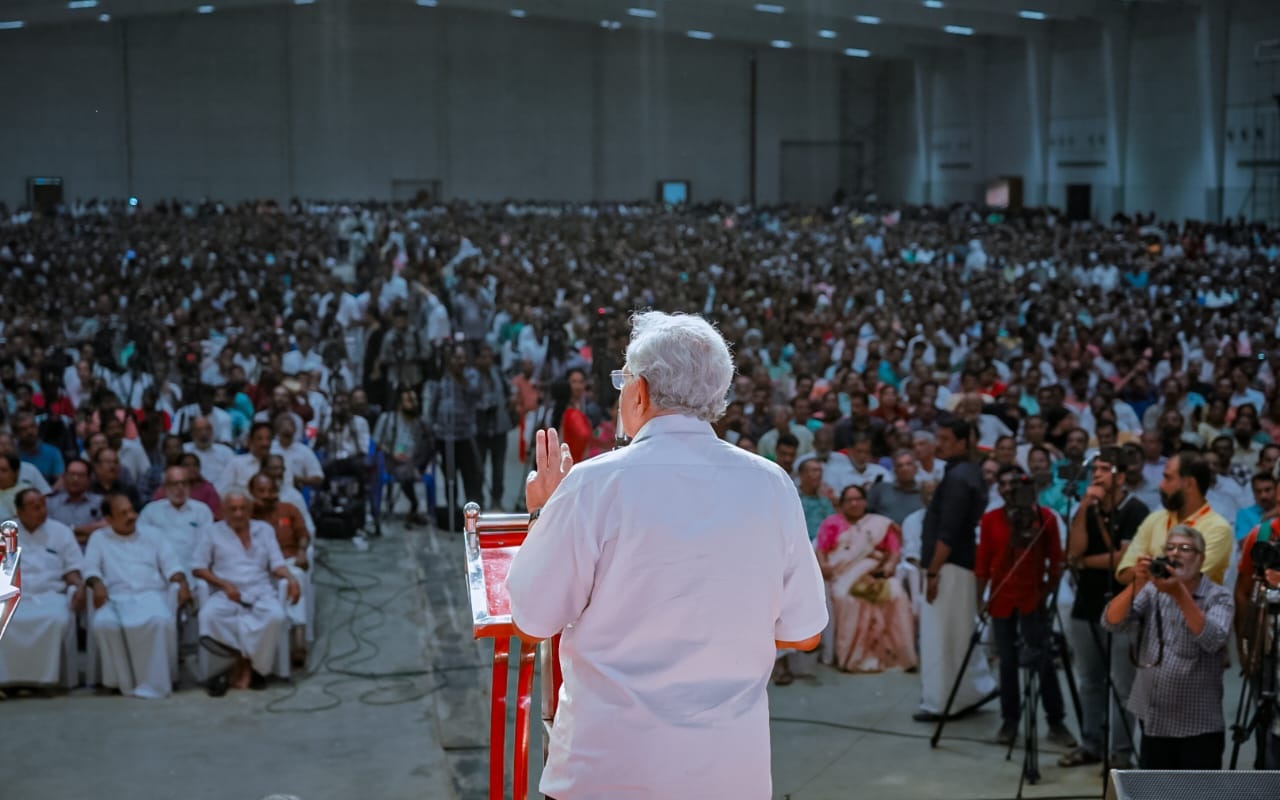
Elamaram Kareem
THE national seminar organised by CPI(M) in Kozhikode, opposing the imposition of the Uniform Civil Code marked the first step towards consolidating the secular forces for a collective struggle against the proposed Uniform Civil Code, which the Modi government is introducing to jeopardise the unity and communal harmony of India. The seminar received an overwhelming response, exceeding expectations, with a packed hall and people attentively listening to the speeches, some even standing outside to participate.
The seminar saw the active participation of numerous parties and organisations, including CPI, Kerala Congress, NCP, INL, JDS, LJD, AIDWA, ministers, along with various Muslim organisations such as Sunny, Mujahid, MES, Christian organisations, Dalit Federation, SNDP, Adivasi Kshema Samiti, among others. Speakers representing diverse religious groups commended CPI(M) for its unwavering commitment to secular principles. All the participating organisations joined hands in resolute opposition to the government's push for the Uniform Civil Code and proposed a united agitation against it. Esteemed writer and member of the Sahitya Academy, KP Ramanunni, chaired the seminar.
CPI(M) general secretary, Sitaram Yechury, inaugurating the seminar threw light on the RSS and Sangh Parivar's divisive tactics and their communal agenda. He strongly expressed that the Uniform Civil Code (UCC) was yet another move to advance their Hindutva politics, aimed at perpetuating hatred against the Muslim community in India.
Yechury emphasized the erosion of constitutional principles since the Modi government came into power in 2014. He highlighted how parliament had been instrumentalised to amend the constitution and pass laws that furthered their divisive objectives. This was evident during the abrogation of Article 370 and the revocation of statehood from Jammu and Kashmir, as well as the passing of the Citizenship Amendment Act. The UCC is the latest tool in their communal agenda, specifically targeting the Muslim community.
Under the guise of advocating societal equality and reforming religious personal laws, there seemed to be a clear agenda to isolate and polarise the Muslim community. Yechury stressed that the CPI(M) advocates a two-pronged strategy to ensure equal rights for women across all communities. Firstly, aim to strengthen and expand existing secular laws that apply to women from all backgrounds. Secondly, a gradual approach to reform personal and customary laws of all communities, involving consultation with representatives, both men and women, from the respective communities.
Sitaram Yechury emphasized that sudden and radical changes to personal laws, which have existed for many years, may lead to resistance, conflicts, and social unrest. Each community has its distinct practices and beliefs, and harmonising them under a single code could result in confusion and disputes. The diverse customs and practices of India's numerous communities may not easily fit into a uniform set of laws. He pointed out that opposition to the UCC is not limited to religious minorities; certain tribal groups have also expressed concerns about its potential effects on their unique customs and traditions. Even within Hinduism, there are various sub-cultures, each with their own distinct identity, traditions, and customs. Applying a single set of personal laws with brute force across all religions, sub-sects, and denominations could erode their uniqueness and diversity.
The 22nd Law Commission has commenced the process of gathering public opinions on the Uniform Civil Code. At the same time, our prime minister is also hinting at the necessity of implementing the UCC. These occurrences are unlikely to be coincidental but rather part of the polarising agenda pursued by the BJP and the Sangh Parivar. The decision to reopen public consultations on the UCC, despite the previous Law Commission conducting extensive consultations just five years ago, raises questions about the sanctity of the previous Commission's findings. It also implies the possibility of diluting or modifying its recommendations.
The 21st Law Commission recommended targeted reforms within personal and customary laws of different communities. It explicitly dismissed the idea of a Uniform Civil Code, stating it was "neither necessary nor desirable." One could understand if several decades had passed since the initial consultation paper, and societal and legal changes warranted a re-evaluation. However, it seems rather peculiar to reopen a matter that was extensively studied for almost two years, with comprehensive consultations by the previous Law Commission, a mere five years ago.With numerous pending issues awaiting consideration before the Law Commission of India, one wonders why the Commission is choosing to revisit a concluded matter related to the Uniform Civil Code. To the public at large, it appears as if the Law Commission is acting at the behest of the BJP and Sangh Parivar, with the intention of implementing the UCC, potentially with an eye on the 2024 General Elections.
During a recent function in Bhopal, Prime Minister Narendra Modi reaffirmed his government's dedication to implementing a Uniform Civil Code and criticised those who opposed the idea, accusing them of engaging in "appeasement" politics. He argued, "In one house if one member has one law and another member has another law, can that household, family run? So how will the country run with a dual system?" The objective of the Modi government appears to be geared more toward electoral gains through polarisation rather than genuine social reformation. There seems to be a well-organised agenda at play to instigate hatred in society and foster animosity among its people. The implementation of the UCC is perceived as aligning with the RSS's other agendas, such as the Kashmir issue, CAA, triple talaq, goraksha, Hijab ban, and love jihad.
The Kozhikode seminar has conveyed a strong message to the Modi government that a collective movement of political parties, religious, and social groups is determined to unite in resistance against their divisive agenda. It reaffirmed the commitment to safeguarding India's democracy and preserving its secular fabric.


